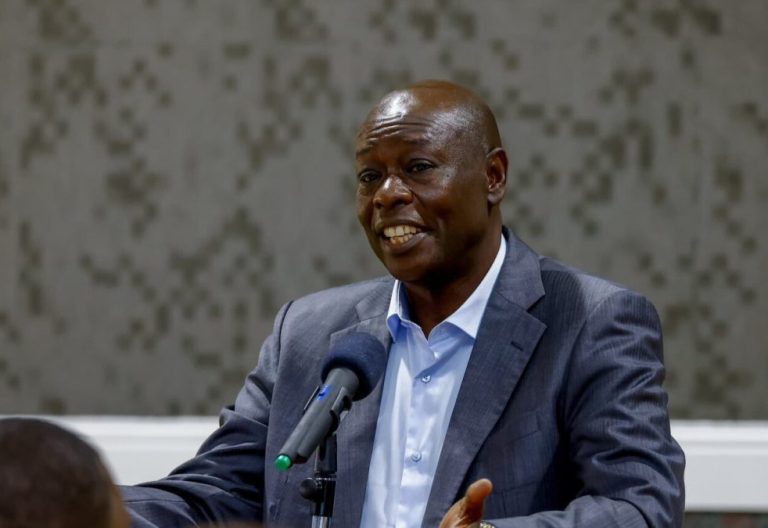Leaders demand answers from police as men disappear without trace

Almost a week after Muslim cleric and scholar Abdiwahab Sheikh Abdisamad was allegedly abducted by unknown men on Tubman Road in Nairobi’s Central Business District, he is yet to be traced.
The scholar, who had strong opinions relating to the Kenya-Somalia relationship, was reportedly abducted by four men who handcuffed him before bundling him into a vehicle, registration number KCW341Y. The vehicle sped off towards Muindi Mbingu street.
The Directorate of Criminal Investigations (DCI) boss George Kinoti last week said investigations into the abduction had been launched and promised to issue a status report in a week’s time.
Kinoti had met the Supreme Council of Kenya Muslims leaders, who expressed concern over the rising cases of enforced disappearances, latest being that of the missing scholar who is the Executive Director of the Institute for Horn of Africa Strategic Studies and an analyst at Southlink Consultants.
The 10am alleged abduction outside City Market was witnessed by many people. Witnesses said some of the men were armed and had handcuffs.
National Transport and Safety Authority (NTSA) has, however, said the vehicle number plate had been flagged as illegal since it has not been registered to anyone in the authority’s database.
Ongoing terror case
The distinct manner of the abductions point to the work of a well organised group.
In another case on August 18, seven armed men accosted Mombasa businessman Abduhakim Salim Sagar at Mombasa Old Town and bundled him into a waiting vehicle registration number KBQ 035C before speeding away.
Though the Coast regional commissioner John Elungata said the man had been arrested by police officers and was assisting with investigations, the regional police boss Manase Musyoka later said police had not arrested the man and that the only report they had was that of a missing person that had been reported at Central Police Station, Mombasa.
Sagar, 40, and a father of four had been reporting to the police once a month because he was released from custody in 2018.
He had an ongoing terror case at Shanzu Law Courts and has been out on bond.
Following revelations that some 11 decomposed bodies retrieved from River Tana are lying unclaimed at Garissa Referral Hospital mortuary, families with missing kin from across the country have started streaming to the facility to check if their loved ones are among the dead.
On Monday, five families visited the morgue though none could physically identify the bodies because of their condition.
Speaking outside the morgue, Peter Mariga from Kisii county, said three of his relatives have been missing for the last one month.
Mohamed Siyat from Tana River county is looking for his two brothers, Mohamed Ismail and Jibril Sawane, who he alleged were kidnapped from Hola on April 12, 2018 and they have not been traced to date.
“It’s three months since we started looking for our brothers but all has been in vain. We reported the matter to different authorities but nothing has been forthcoming,” Mohamed said.
DNA test
Among those who visited the morgue are also the relatives of Ahmed Farah who disappeared in 2014 and has not been found to date.
The families are now calling on the government to help facilitate DNA testing since the bodies are in bad shape and physically unrecognisable.
Kenya National Commission on Human Rights (KNCHR) coordinator for North Eastern region Thuo Kinyanjui said the commission will work closely with relevant government agencies to unveil the mystery behind the torture, killing and dumping of the bodies in River Tana.
Kinyanjui further urged the county government to ensure that they do not dispose off the bodies without following the right procedure.
“The moment we received reports that the bodies showed signs of torture, we immediately deployed a team here to review the bodies and see if there were identifiable marks of torture and ensure that no disposal of the bodies will be done without proper procedure,” Kinyanjui said.
“There has to be medical investigations and if possible samples of DNA collected and properly stored for further investigations,” he added.
He urged the families who have lost their loved ones in the last three months to come forward to help in matching their identity through DNA.
In the last one year, scores of people have disappeared without a trace while others have been found murdered and bodies dumped.
Among the missing is security analyst and former military officer Mwenda Mbijiwe, who has been missing since June 12 when he reportedly left Nairobi for Meru, his paternal home.
Family members said Mbijiwe was last seen using a hired car and was accompanied by a friend, said to be a police officer, who was also in another hired car.
The vehicle was later found dumped off the road. Mbijiwe’s last Facebook post was on June 11, a day before he went missing, where he castigated the Judiciary for alleged activism.
Businessman Dafton Mwitiki went missing on March 11 last year. Two days later, his car was found abandoned on Kimbo-Kiganjo Road in Juja, Kiambu county. The probe into the incident is still ongoing.
Also yet to be found are Fauz Mohammed, 27, Ramadhan Omar, 23, and Brian Hamisi, 23, who were separately picked from their houses in Likoni, Mombasa county on April 22.
They were picked in the wee hours of April 22 in a coordinated operation by about 20 heavily armed people believed to be security agents.
According to Amnesty International, most of the victims are male and residents of Nairobi, Wajir, Garissa and Mombasa counties.








